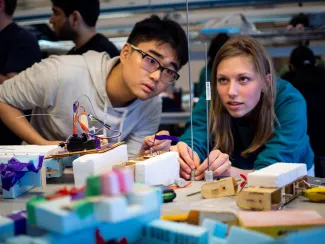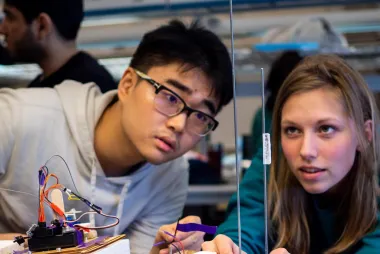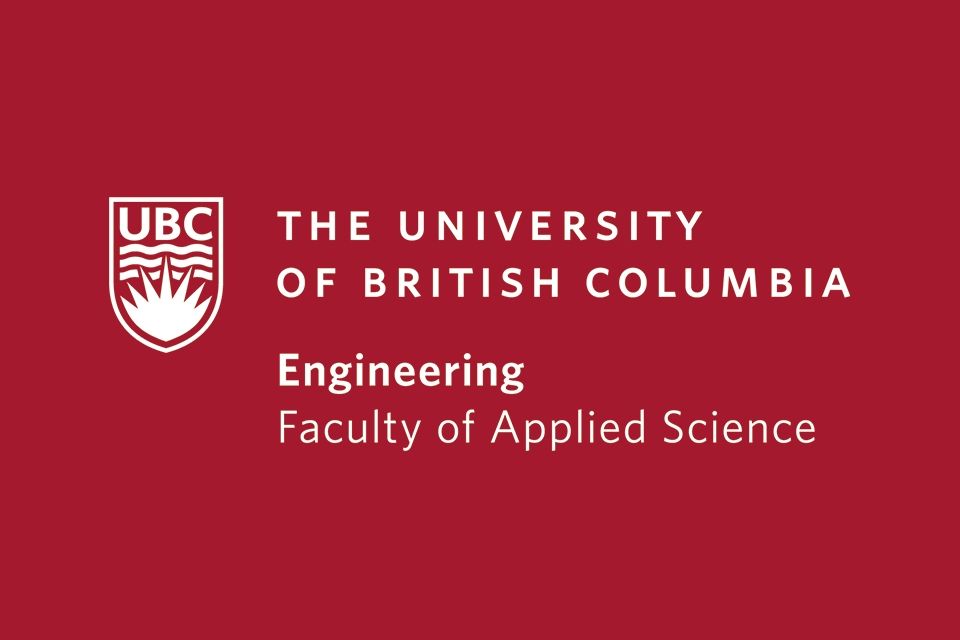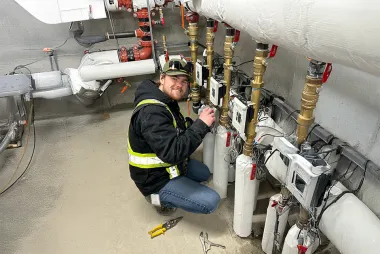"Take the risk, you'll either make a memory or learn from it."
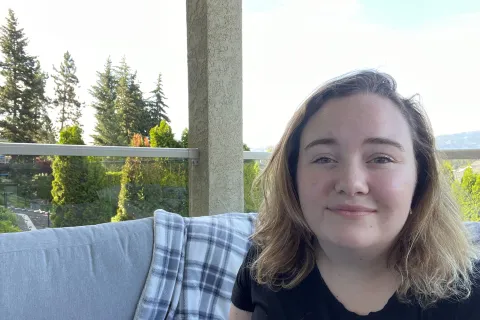
Abbey Brown
- Degree: Bachelor of Applied Science
- Program:
- Campus: Okanagan
Hi! My name is Abbey (she/her) and I am in my 3rd year of mechanical engineering. Before beginning my degree at the School of Engineering, I was not the most outgoing person. I tended to be quite quiet until I felt comfortable in my environment, but being on campus and in person has pushed me to learn to be more outgoing. Most recently, I accepted a position within UBCO’s Engineering Society and I am excited to see what adventures 3rd will bring. In my last year of high school, I had the opportunity to be a part of the Engineering Dual Credit program. I was introduced to many first-year engineering students and a few other high school students like myself. I got to experience an engineering design course and work in a group on a design project. Even though I was nervous to be in a university course for the first time, it was truly a great learning experience and I believe that I grew tremendously from it. The Dual Credit program was what greatly impacted my decision to choose the School of Engineering.
How did you decide your current UBC Engineering discipline, or why did you choose UBC Engineering?
There were a few experiences that led me to choose Mechanical Engineering as my discipline. When I first started at the School of Engineering I was quite confused about which discipline path would best suit me. Near the end of my first year, the school held a “pick your discipline” event where first-year students got to meet some of the professors from each discipline. After that event, I was still torn between two pathways. I then took it upon myself to learn more about the courses that would be taught within each discipline and within my research, I learned about the additional options that the school offers, more specifically the Biomedical Option. After learning about the Biomedical Option, I knew that that was what I wanted to learn about, so my discipline choice became clear. Mechanical Engineering was the path for me.
What has made your time at UBC Engineering memorable?
I began attending UBCO when the world was going through a pandemic and isolation, so my first year consisted of Zoom meetings and the walls of my bedroom. When 2nd year came around, I was so excited to finally be in person, to get to meet new people face to face instead of as a little box and name tag from the screen of my computer. There were still some restrictions on what could and could not be done on campus, but I don’t think any extravagant event would have been what made my time at UBC Engineering memorable. The moments I will remember are the moments in the materials and water labs where I got hands-on experience with new equipment and working with my peers on projects. But I think the moments I will remember the most will be the ones filled with laughter and happiness. As cliche as it sounds, I will remember peaceful walks through campus in the fall and spring, grabbing coffee with friends and enjoying the natural beauty that surrounds UBCO.
Tell us about your experience in your program. What have you learned that is most valuable?
I think that all the technical information I have gained from professors and teaching assistants is quite important, but the truly valuable knowledge I’ve obtained in my program came from the relationships I made with my peers and my professors. During my time in the School of Engineering, I learned that working as a team is enjoyable and I learned that different people need different forms of communication. I gained experience in setting and meeting deadlines, active listening and cooperate with a larger group of people. These experiences and teamwork skills are ones that will set the foundation for when I join the professional world, as I hope to be a part of research teams and cooperative engineering teams.
What resources or events organized by UBC Engineering have helped you in your academic, professional or entrepreneurial journey thus far?
During my time at UBCO, I have found that some of the most useful resources are the bookable study rooms on campus. Being a commuter student, driving to and from the campus takes up a significant amount of time, and I tend to come home to distractions. Being able to study and refresh on the material in a quiet space really makes a difference for me and I’m sure many others on campus. I also truly appreciate being able to learn from women part of the engineering world. Getting to learn under strong and successful women demonstrates how capable of success women are in a typically male-dominated field. Lastly, I value the social events that have happened on campus, like the spring carnival, as ways to relax from studying.
What is one piece of advice you would share to a student entering UBC Engineering?
Some advice I wish I had had in my first year would be to stay caught up in your classes. Taking five to six courses can be heavy, top that off with labs and tutorials and your schedule will get pretty full, so take the time you can to keep your notes clean and refresh your knowledge. However, on the opposite end, don’t pass up on the opportunity to have some fun. Your years at UBC will go by in a flash, so make those fun memories. I guess the best way to sum this up is that it is all about the balance you hold between your school life and your personal one.
Many of today’s jobs did not exist 10 years ago, and we do not know for certain what the workforce will look like 10 years from now. How do you see the remainder of your studies in the Faculty of Applied Science preparing you for the future of work?
Going into my third year, I expect to gain a more in-depth understanding of more specified mechanical theories. I am also a part of the co-op program and plan on taking the following year to complete four work terms before returning for my fourth year, where I will get to complete courses focused on the Biomedical aspects of engineering. I believe that the next few years will not only prepare me for my future in the professional world with information but also with work experience, professional development and team skills.
